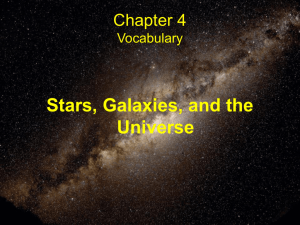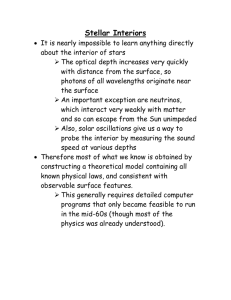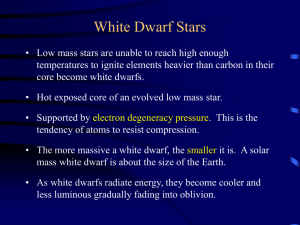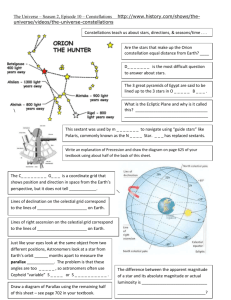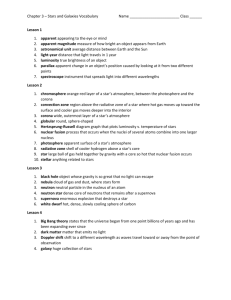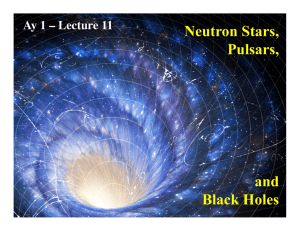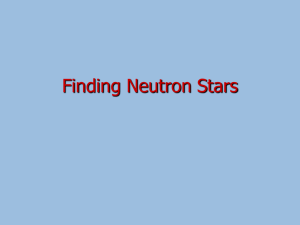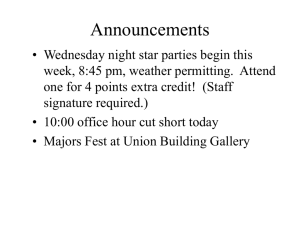Editing for Concision - Fayetteville State University
advertisement
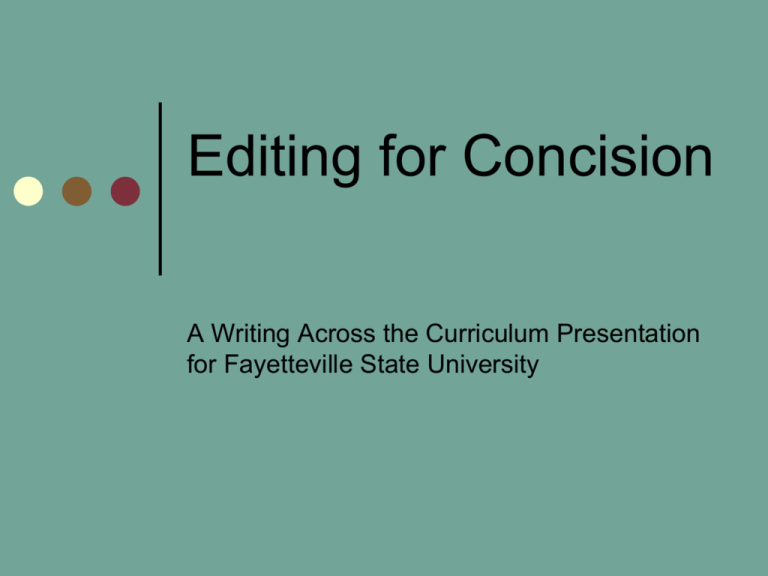
Editing for Concision A Writing Across the Curriculum Presentation for Fayetteville State University WAC at FSU Writing Across the Curriculum at Fayetteville State University is funded by a Title III grant. For more information about WAC at FSU, contact Sonya Brown at (910) 672 1861 or scbrown@uncfsu.edu Editing for Concision This presentation is designed to help writers remove wordiness and thereby increase the clarity and readability of their document. Concision Defined To be concise is to be brief. In writing, concision means using the fewest words necessary to convey your ideas clearly to your intended readers. Concision as Ideal Concise writing conveys information quickly. It is ideal for documents like: o Memoranda, Business E-mail, Reports o PowerPoint Presentations o Instructions, manuals o Documents in which information is more important than expressions of individual style Editing Takes Times o o Editing often takes 5-20 minutes per substantial paragraph. Budget time to EDIT after you REVISE and before you PROOFREAD for mistakes in grammar, punctuation, spelling, and numerical data (phone numbers, dollar values, etc.). Editing Time is Worthwhile Studies suggest that writers whose prose is clear, concise and easy-to-read are perceived as intelligent—more intelligent than writers whose prose confuses readers. Editing for clarity makes documents easier to use, saving readers’ time, effort and sometimes money Shorter documents cost less to print, saving individuals and companies money through paper, ink, wear-and-tear on equipment Concision and Readers For readers unfamiliar with your material: o Explain technical terms and acronyms when necessary o Provide examples and explanations to improve clarity Concision and Interest o o Some documents, like editorials, personal essays, and short stories, interest readers through content AND an engaging style. Some authors use more words than “necessary”. Their writing interests readers because the “extra” words are entertaining. Don’t Edit and Write at the Same Time o Focusing on concision instead of content at first can derail your train of thought. When you have all of your information where you want it in your document, EDIT for concision. Note: Read more about the Process of Writing on the WAC homepage. How to Edit for Concision o o o o Trim Unnecessary Modifiers Remove Common Redundancies Replace Extra Forms of “to be” Use Active Verbs instead of passives and noun forms Editing is Multi-Tasking Although four steps are listed here, they overlap occasionally. You may find you have removed significant bulk using only one or two steps! Editing Step 1: Trimming Unnecessary Modifiers Modifiers • Describe other things. By describing, they “change” or “modify” the things they describe • Are divided into two general groups, adjectives and adverbs Adjectives and Adverbs o Adjectives and adverbs can be words (yellow, soft, softly, very) or phrases (in the car, up the road, at a rapid pace) Prepositional Phrases are Modifiers Prepositions are words like in, to, for, by, at, beside, on, and with. They usually begin prepositional phrases, that end with a noun (a person, place or thing) or pronoun. Ex. in the car, to her, with Julian, beside my desk, by the esteemed author Adjectives o Adjectives describe nouns (people, places, things) o o o o o o The gray house The tall woman The challenging, but uplifting speech The color of the house The houses in my neighborhood The tree beside the building Adverbs o Adverbs describe verbs, adjectives, and other adverbs o o o o o She walked slowly She ran through the rain He was very shy He smiled very shyly She walked so slowly “Strings of Prepositions” Richard Lanham, in Revising Business Prose, notes that many wordy documents contain “strings” of prepositions, and recommends cutting unnecessary prepositional phrases entirely OR replacing some with single words. Ex. at a fast pace=quickly in considerable desperation=desperate/ly in a patient manner=patiently Need More on Prepositions? Explore Robin L. Simmons’ site on identifying and using prepositions. Hover your cursor over the link below and “right click” to Open Hyperlink and visit the site: http://www.chompchomp.com/terms/preposition.htm Trimming Unnecessary Modifiers o When you are in the process of editing, look for both adjectives and adverbs, including whole phrases like prepositions, to cut out or reduce in size. Need an example? o When you are [] editing, look for [] adjectives and adverbs, including preposition phrases, to cut [] or reduce []. Editing Step 2: Redundancies Redundant writing has the same ideas repeated in different words. Keep in mind! Sometimes, writers repeat ideas in more than one style because they anticipate that readers will need more than one explanation to grasp new or difficult concepts. Examples of Common Redundancies consensus of opinion (consensus means shared opinions) end result (a result is an end) first and foremost (foremost means first or “in front”) Need More on Redundancies? Explore Richard Nordquist’s page of common redundancies for about.com. Hover your cursor over the link below and “right click” to Open Hyperlink and visit the site: http://grammar.about.com/od/words/a/redunda ncies.htm There are hundreds of common phrases listed here! Editing Step 3: Replace Forms of “to be” o Forms of “to be”: am, is, are, was, were, be, being, become, became “To be” verbs often “help” other verbs. Often, replacing them results in more efficient sentences. o Examples of Replacing “to be” Verbs What Jeannette was referring to is our recent adventure in Brazil. Revised: Jeannette referred to our recent adventure in Brazil. My mother is a brilliant writer. Revised: My mother writes brilliantly. “There is” and “There are” Many writers overuse these two phrases. o Example: There are many people who want to adopt infants. Revision: Many people want to adopt infants. Example: There is an overwhelming majority in favor of replacing the windows. An overwhelming majority favor replacing the windows. o Need More on “to be” Verbs? Explore Professor Deborah De Rossa’s advice to students. Hover your cursor over the link below and “right click” to Open Hyperlink and visit the site: http://www.unc.edu/~dcderosa/Draftworkshops/tobeverbs.html Editing Step 4: Use Active Verbs o Active verbs are those that are performed actively by the subject: Examples: Sue jumped. The minister spoke. The dog wagged its tail. Passive: The Opposite of Active Passive verbs: • Are performed ON, not BY, the subject • Typically require “to be” • Often appear with the preposition “by” Example: Sue was jumped on by the dog. The minister was spoken to by Jamal. The funding was authorized. Passive Strategies o o Usually, passive creates wordiness or even lack of clarity. In professional documents, use passive to protect people from blame in appropriate situations. You must make the ethical call! Example: You did not sign your check. Revision: Your check was not signed. Need More on Passives? Read Professor Jerz’ webpages on Active and Passive tense, starting with. Hover your cursor over the link below and “right click” to Open Hyperlink and visit the site: http://jerz.setonhill.edu/writing/grammar/act-pass.htm Noun Forms Using noun forms instead of active verbs also clutters prose: Example: Scientists made the discovery of several new Jovian moons. Revised: Scientists discovered several new Jovian moons. o Notice that the first sentence uses the noun discovery rather than the verb discovered. o Examples of Noun Forms Tyrone is making a plan to write a book. Revised: Tyrone plans to write a book. The fire has had a profound effect on the ecosystem. Revised: The fire has profoundly affected the ecosystem. Editing Review Step 1: Trim Unnecessary Modifiers Step 2: Remove Redundancies/Repetition Step 3: Replace “to be” verbs Step 4: Use Active Voice Practice Editing: Step 1 Trimming Modifiers Pause the presentation here. Identify ALL the modifiers in the following and copy them onto a sheet of paper. In order to define a neutron star it is necessary to state that it is a small star, but in spite of its small size it is very dense; in fact, as amazing as it may seem, most neutron stars are comparable to our sun in mass, or gross weight. But although neutron stars are as heavy as our sun, however, it is important to realize that they are much smaller. In other words, these dense stars are only a few miles in radius, whereas the radius of the sun is about 700,000 miles. Which did you find? In order to define a neutron star it is necessary to state that it is a small star, but in spite of its small size it is very dense; in fact, as amazing as it may seem, most neutron stars are comparable to our sun in mass, or gross weight. But although neutron stars are as heavy as our sun, however, it is important to realize that they are much smaller. In other words, these dense stars are only a few miles in radius, whereas the radius of the sun is about 700,000 miles. Quick Question Why aren’t phrases like to define and to realize highlighted? Aren’t they prepositional phrases, and therefore modifiers? No, these are verb forms called infinitives. You may edit some or all of them out, but they are not modifiers. Cut the modifiers that will not affect the sentences’ ability to make sense first. In order to define a neutron star it is necessary to state that it is a small star, but in spite of its small size it is very dense; in fact, as amazing as it may seem, most neutron stars are comparable to our sun in mass, or gross weight. But although neutron stars are as heavy as our sun, however, it is important to realize that they are much smaller. In other words, these dense stars are only a few miles in radius, whereas the radius of the sun is about 700,000 miles. Edited Paragraph To define a neutron star it is necessary to state that it is a small star, but it is very dense; in fact, as amazing as it may seem, most neutron stars are comparable to our sun in mass, or gross weight. But although neutron stars are as heavy as our sun, however, it is important to realize that they are much smaller. In other words, these dense stars are only a few miles in radius, whereas the radius of the sun is about 700,000 miles. Redundancies & Repetition Leaving the modifiers highlighted, let’s now try to find redundancies and repetition. To define a neutron star it is necessary to state that it is a small star, but it is very dense; in fact, as amazing as it may seem, most neutron stars are comparable to our sun in mass, or gross weight. But although neutron stars are as heavy as our sun, however, it is important to realize that they are much smaller. In other words, these dense stars are only a few miles in radius, whereas the radius of the sun is about 700,000 miles. First Redundancy To define a neutron star it is necessary to state that it is a small star, but it is very dense; in fact, as amazing as it may seem, most neutron stars are comparable to our sun in mass, or gross weight. But although neutron stars are as heavy as our sun, however, it is important to realize that they are much smaller. In other words, these dense stars are only a few miles in radius, whereas the radius of the sun is about 700,000 miles. In this sentence, to define and to state describe the same action in two ways. Are both or either necessary? Another Redundancy/Repetition To define a neutron star it is necessary to state that it is a small star, but it is very dense; in fact, as amazing as it may seem, most neutron stars are comparable to our sun in mass, or gross weight. But although neutron stars are as heavy as our sun, however, it is important to realize that they are much smaller. In other words, these dense stars are only a few miles in radius, whereas the radius of the sun is about 700,000 miles. Here, you see that some of the modifiers are the same as a redundancy. Quick Question Why isn’t the information about the sun’s radius compared to a neutron star’s highlighted as a redundancy? Few readers know a lot about neutron stars. That information isn’t mere repetition. It’s adding detailed information, and probably helps readers imagine these types of stars, so we’ll leave it for clarity. Step 3: Identify “to be” verbs Look for all the “to be” forms you can find in this paragraph. How many do you count? To define a neutron star it is necessary to state that it is a small star, but it is very dense; in fact, as amazing as it may seem, most neutron stars are comparable to our sun in mass, or gross weight. But although neutron stars are as heavy as our sun, however, it is important to realize that they are much smaller. In other words, these dense stars are only a few miles in radius, whereas the radius of the sun is about 700,000 miles. Did you find 9 “to be” verbs? To define a neutron star it is necessary to state that it is a small star, but it is very dense; in fact, as amazing as it may seem, most neutron stars are comparable to our sun in mass, or gross weight. But although neutron stars are as heavy as our sun, however, it is important to realize that they are much smaller. In other words, these dense stars are only a few miles in radius, whereas the radius of the sun is about 700,000 miles. Editing Step 4: Action Verbs Now we can really cut. Look at the paragraph on the next slide, with modifiers, redundancies and “to be” verbs highlighted. Cut and rearrange the sentences to eliminate some or most of the extra words. Pause the Presentation and Edit! To define a neutron star it is necessary to state that it is a small star, but it is very dense; in fact, as amazing as it may seem, most neutron stars are comparable to our sun in mass, or gross weight. But although neutron stars are as heavy as our sun, however, it is important to realize that they are much smaller. In other words, these dense stars are only a few miles in radius, whereas the radius of the sun is about 700,000 miles. Here is one possibility A neutron star is a small, dense star, equal in mass, or gross weight, to our sun, but having a radius of only a few miles in contrast with our sun’s radius of about 700,000 miles. This paragraph went from 86 to 36 words! Note: You can go backward in this presentation to look at the original paragraph again. Here’s another Small, dense neutron stars are only a few miles in radius in contrast with the sun, which has a radius of approximately 700,000. Yet neutron stars equal the sun in mass, or gross weight. This paragraph went from 86 to 35 words! Notice! Not all modifiers or “to be” verbs are removed from the edited versions of the paragraph: Small, dense neutron stars are only a few miles in radius in contrast with the sun, which has a radius of approximately 700,000. Yet neutron stars equal the sun in mass, or gross weight. No One Right Way If your edited paragraph means the same as the original, is clear to a reader, and cuts unnecessary words, you’ve done it correctly. You are ready to proofread the paragraph! Use the link from the WAC Student Resources page to find information about proofreading! Question My paper must be 15 pages long. How can I edit to remove words but still complete my assignment? Answers o You probably need to develop more IDEAS to include in the paper. Talk with your instructor or a writing tutor, or visit the Prewriting page on the WAC student site for help with this. Additional Reading and Practice Editors and writers may also find the following books useful: The Elements of Style, Strunk and White. Style: Ten Lessons in Clarity and Grace, Joseph Williams. Revising Business Prose, Richard Lanham. Understanding Style, Joe Glaser.
